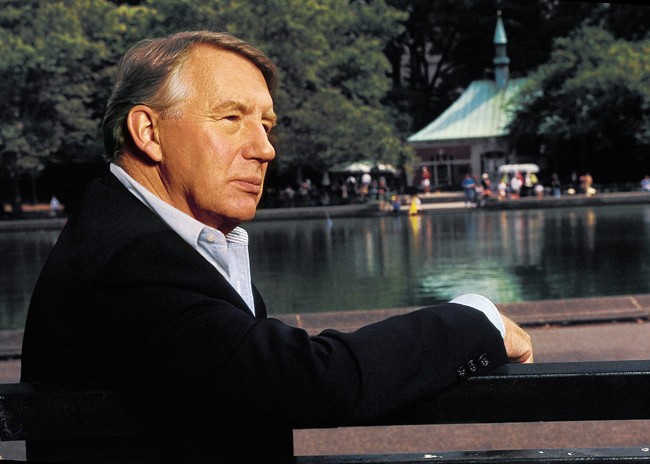TORONTO – Robert MacNeil entered the media industry reluctantly, hoping the skills he acquired as an aspiring playwright would be enough to help him make ends meet as a journalist.

He accumulated more than just a stream of steady paycheques over the ensuing 40-year career working for some of the world’s most prominent news outlets.
Honours and awards for his bold and in-depth reporting cemented his reputation as one of the most influential leaders in the field.
MacNeil will collect another accolade Tuesday when he receives the Honorary Tribute from the Canadian Journalism Foundation. The gala event will also see the CBC’s Patrick Brown honoured with the foundation’s lifetime achievement award.
The ceremony will mark a rare return to MacNeil’s native soil. The journalist famed for his coverage of seminal American political events and contributions to U.S. public television was born in Montreal in 1931.
He grew up in Halifax, where his father worked as a RCMP naval officer chasing rum runners during the Great Depression.
MacNeil spent his teens in Ottawa before returning to Halifax for university, a project he abandoned to pursue an acting career.
His theatrical ambitions took him south of the border, where MacNeil said he had an epiphany that redefined his career path.
“I was crossing Times Square on a very hot September day, and suddenly a voice spoke to me, like the voice of God, and said: ‘You’d be a lousy actor’,” MacNeil said in a telephone interview from New York City. “‘You have some technique and a voice, but you’re meant to be the quiet one behind the scenes. You’re meant to be a writer.'”

Get daily National news
MacNeil returned to Ottawa to complete his undergraduate studies at Carleton University, but still had his sights set on a stage career. His early years in London, where he moved upon graduation, were dominated by unsuccessful attempts to get the plays he wrote produced.
When marriage forced MacNeil to get practical about his career and shift to journalism full-time, however, success came quickly.
A five-year stint at Reuters soon led to a job as a foreign correspondent with NBC, which gave him a front-row seat to some of the 20th century’s defining moments.
MacNeil was in Berlin the night before construction on the eponymous wall began, in Cuba during the missile crisis of 1962 and in the presidential motorcade a year later when John F. Kennedy was assassinated in Dallas.
His hard-news assignments taught him to appreciate the journalist’s role as a storyteller, he said, adding they even managed to satisfy his desire to create great narratives.
“Being a journalist, especially if you’re lucky enough to be a foreign correspondent in exciting times, you’re dabbling at the margins of great literature all the time,” MacNeil said.
“You don’t have to have the talents of a Dickens or a Dostoyevsky, but you’re meeting an infinitely variable bunch of characters. And you run into many human stories … They’re there for you to pick up the stories and tell them.”
MacNeil’s success continued during his subsequent stints at the British Broadcasting Corp. and the Public Broadcasting Service in New York, where he provided prominent coverage of the politics of the day.
He believes his greatest career triumph came in 1975 when he persuaded PBS executives to adopt what was then a novel format for hard-news coverage. His proposal to launch a half-hour nightly program devoted to one key story was seen as a refreshing complement to the rapid-fire newscasts available on the other networks.
The resulting program, originally dubbed the Robert MacNeil report, eventually led to a partnership with friend and co-host Jim Lehrer. The half-hour MacNeil/Lehrer Report endured for eight years before doubling in length and being rebranded as the more comprehensive News Hour _ a program that still headlines PBS’ evening coverage.
MacNeil attributes the program’s popularity to the fact that it provides an alternative to the fast-paced reporting that characterizes the 24-hour news cycle. He joked that getting the concept off the ground required “the courage to be boring,” but said the in-depth format is even more viable now than it was at its inception.
Today’s television landscape features “a more frantic … more hysterical kind of competition for eyeballs, and that competition leads in the opposite direction from what we regard as the value of the News Hour, which is reasonably quiet, civilized interviews and reportage,” he said.
MacNeil has continued to take on reporting challenges since his retirement from PBS in 1995. His most recent effort was a six-part series on autism, a project featuring the story of his grandson’s struggles with the condition and the impact it’s had on his family.
Retirement also gave MacNeil the chance to realize his ambition of writing fiction. He has published a handful of novels and is working on two more.
He has even had a chance to vicariously enjoy the theatrical success that eluded him _ one of his four children has become a Tony Award-winning stage designer.
MacNeil said he is thrilled to receive his latest Canadian honour, adding it feels to good to be recognized by professionals in his homeland.
“I thought Canadians had forgotten all about me,” he said. It’s very nice not to be forgotten.”








Comments